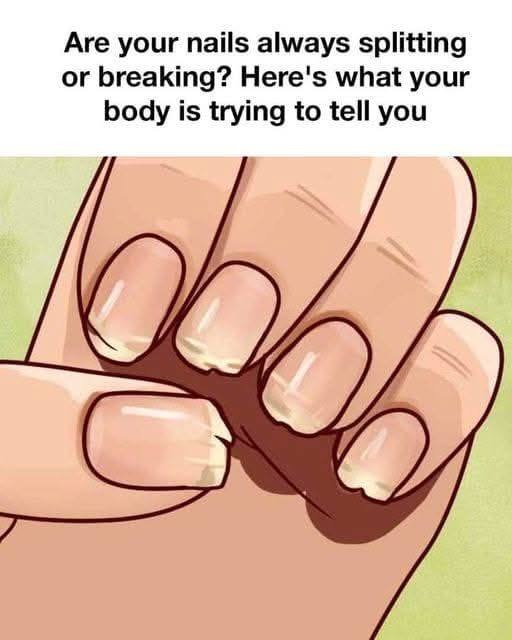ADVERTISEMENT
Are Your Nails Always Splitting or Breaking? This is a Sign Your Body is Trying to Tell You
Nails are often considered an indicator of overall health, and when they become brittle, split, or break easily, it can be a sign that something is off in your body. While many people experience nail problems from time to time, chronic splitting or breaking nails can be a cry for help from your body, signaling underlying issues that need attention. Understanding the possible causes and remedies can help you address the problem effectively.
Common Causes of Splitting and Breaking Nails
There are several reasons why your nails may be prone to splitting or breaking. Let’s look at the most common culprits:
1. Nutrient Deficiencies
One of the most common reasons for weak, brittle nails is a lack of essential vitamins and minerals. Specifically, deficiencies in:
- Biotin: A B vitamin essential for nail health.
- Zinc: Important for protein synthesis and tissue growth.
- Iron: Lack of iron can lead to brittle nails, as it is crucial for oxygen transport to cells, including nail cells.
- Vitamin A: Crucial for skin and cell repair, including nails.
How to Fix It: Add biotin-rich foods like eggs, nuts, and avocados to your diet. Incorporate iron-rich foods such as spinach, red meat, and legumes, and consider taking a multivitamin if needed.
2. Dehydration
Just like skin, nails can become dry and brittle when your body isn’t properly hydrated. Dehydration can cause nails to lose moisture, making them prone to splitting and breakage.
How to Fix It: Ensure you’re drinking enough water throughout the day—aim for at least 8 cups or more, depending on your body’s needs. You can also use a nourishing hand cream or cuticle oil to hydrate your nails externally.
3. Overuse of Nail Products
Frequent use of nail polish, especially without giving your nails a break, can damage their surface. Acetone-based removers can also strip your nails of essential oils and moisture, contributing to splitting and breaking.
How to Fix It: Give your nails a break between manicures. Opt for non-acetone polish removers, and when applying polish, choose a nourishing base coat that will protect your nails from damage.
4. Exposure to Harsh Chemicals
Prolonged exposure to household cleaning products, detergents, and other harsh chemicals can weaken the nail structure. These chemicals can strip away natural oils, making nails more vulnerable to cracking and peeling.
How to Fix It: Wear gloves when handling chemicals or washing dishes to protect your nails. If you must use harsh products, apply a nail-strengthening treatment afterward.
5. Underlying Health Conditions
Chronic nail issues can sometimes indicate a deeper health problem, such as:
- Thyroid disorders: Hypothyroidism or hyperthyroidism can affect the health of your nails.
- Psoriasis: This autoimmune condition can lead to nail changes, including pitting and separation.
- Diabetes: Uncontrolled diabetes can lead to poor circulation, affecting the nails’ growth and strength.
- Anemia: As mentioned earlier, a lack of iron can make nails weaker.
How to Fix It: If you suspect an underlying health condition is affecting your nails, consult with a healthcare professional for a thorough evaluation and treatment plan.
6. Frequent Hand Washing
Constant hand washing or sanitizing can lead to dry, cracked nails. While hygiene is important, over-washing can remove the oils that naturally protect your nails.
How to Fix It: After washing your hands, always apply a moisturizing hand lotion to replenish the moisture lost during washing. Consider using a thicker hand cream or ointment before bed to repair and protect your nails overnight.
For Complete Cooking STEPS Please Head On Over To Next Page Or Open button (>) and don’t forget to SHARE with your Facebook friends
ADVERTISEMENT
ADVERTISEMENT
